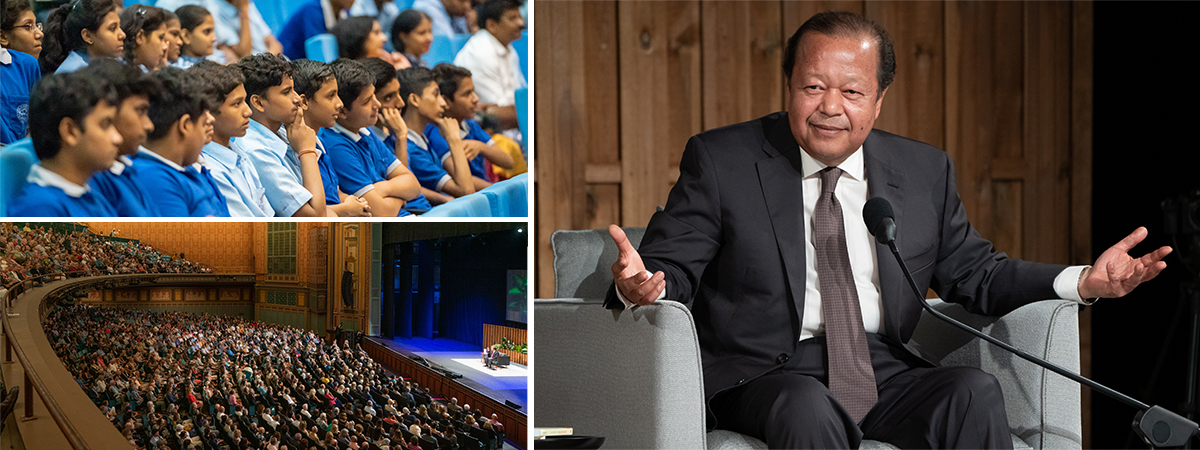Topics
 00:04:02
You Have a Choice
Video
Duration : 00:04:02
You can choose trying to gain victory over yourself, or you can choose for the r...
00:04:02
You Have a Choice
Video
Duration : 00:04:02
You can choose trying to gain victory over yourself, or you can choose for the r...
You as a human being, you have a choice. And you can choose. You can choose to gain victory over yourself or you can choose to try to pursue for the rest of your life trying to gain victory over your problems. In one, you will never win, in one you've got a fair shot.
Nobody, nobody has won over their problems. And now there are many people who think they have. Many people would like to, many people would imagine they would. But nobody has yet conquered their problems. And it is only when you begin to understand that that is the nature of problems. They're not to be conquered. If they get conquered, they're no more problems. That is their nature. They will morph to something else, to something else, to something else. Just when you get everything settled, your cat will run away. Just when you find your cat, your dog will run away. Just as you find your dog, your wife will run away. Just as you find your wife, you will run away. No, no, it's never one thing.
Because you build your house, you like your house and the longer you live in your house, the more leaks it's going to have. The more maintenance it's going to require. That's just the nature of it. The nature.
But we are not set up to be victorious over ourselves. We're not set up for that because the world tells us, "No, conquer your problems, conquer your problems, conquer your problems, conquer your problems." Even if you asked the world, "Okay, I would love to conquer my problems, would you tell me who has won? Give me one name. One. Just one. Just one."
I mean you can imagine a family starts off in some country somewhere—oh I have a dream, and I have this imagination, I'm going to work really hard. I'm going to become successful—and they make it to America. Well, their problems have just begun. And that's what happened. And when will it go away?
- Prem Rawat
 00:03:13
Why Worry?
Video
Duration : 00:03:13
Take a more proactive and positive approach…find a solution to the problem.
00:03:13
Why Worry?
Video
Duration : 00:03:13
Take a more proactive and positive approach…find a solution to the problem.
How many of you worry? I’ll raise my hand too—just, it makes it easier for you. Now, please explain to me how worrying is going to take away your problem?
And here’s a good one—look up “worrying” or “worry” in the dictionary—and it’s really funny. It says, “Something that makes you unhappy.” Something that makes you unhappy...?
My goodness! I like to worry. I like to worry! But I never asked the question, “Why am I worrying? Is this actually going to solve the problem?” No! Because, where action will solve the problem, thinking about a possible solution will solve the problem, worrying will never solve the problem—but I like to worry.
And worrying will make me unhappy—that’s according to the dictionary—and I can vouch for that. And yet every time I am faced with a problem, I worry.
And then one day when I was really into worrying—and feeling quite unhappy—and this may come as a surprise to you—I said to myself, “Why do you want to feel unhappy?”
“Yeah, but it, you know, it’s not in my control. I didn’t do it. This is happening to me; it’s other peoples’ fault; it’s, yeah, da-da, the other people are the....”
I said, “No, no, no.” And this is me, having a conversation with myself, silently, by the way. And I’m saying to myself, “No, it’s you. That even in this moment, you have a possibility not to be unhappy.”
And it is taking a more proactive and a positive approach, which is to find the solution to the problem—and if you don’t know it, find somebody who does.
- Prem Rawat
 00:04:45
Your Inner Wealth
Audio
Duration : 00:04:45
We all have inner wealth, and the more you share it, the more it grows
00:04:45
Your Inner Wealth
Audio
Duration : 00:04:45
We all have inner wealth, and the more you share it, the more it grows
There was a man. He had saved up some money, and one day he came across a piece of land, and the piece of land had been totally abandoned. So he went to the owner and he said, “You know, you have this land. Could you sell me this land?”
And the owner realized he wasn’t using it; it was abandoned. So whatever little money he could get would be welcome. So he made a deal and sold the land pretty cheap. Well, the man got the land. He went in; he started to clean the land. Picked the rocks, put ‘em aside; started to plow. He took care of the land. He plowed the field.
And before you know, he had a beautiful crop. And more he took care of the land, the better his crops were. And he started to get one crop, and then second crop, and third crop, and he just was taking four crops. And soon he saved the money and he became rich.
He got married; he had children, built himself a beautiful house—saved, saved, saved, and he bought gold with the money he saved. He took all the gold, which was substantial, that he had saved and he put it in a box. And he took the box and he buried it in the field. But he didn’t tell his children.
When the time came for him to die, he called all his family and called his children, and he said, “I am going to give you one piece of advice. And if you follow my advice, you will never be poor. And my advice to you is, ‘plow the field.’ That’s all.” He died.
The children were not into plowing the field. They wanted to live in the city; they wanted to have parties; they wanted to have everything else happening. They were not interested in being a farmer.
So, the land fell in disrepair. Weeds started to grow; people started to throw garbage on the land. Years passed by. One day a man came to them and said, “You know, you have this land—it’s completely abandoned. Sell it to me. This is all the money I have.” He had a little bit of money. He said, “Sell it to me.”
The children looked at each other and said, “Yeah, we’re not using it. At least we’ll get a little bit of money from it; that’s good.” And they always kept wondering, “Why did father say, ‘Plow the land and you will never be poor’?” So, the question in the back of their mind...but, they were happy to sell the land and get rid it.
The man who bought the land, he went in, and he plucked the weeds; he threw away the garbage, started to take care of the land. And one day he plowed the field. And when he did, guess what he found? He found the box with the gold.
You are the field, and in this field there is a box. And in this box there is a wealth, and this wealth is more expensive than gold. It’s more expensive than diamonds. There is a wealth—a wealth that, more you share it, the more it grows. There’s no wealth like that in this world except this inner wealth that you have. More you share it, the more it grows. What a wealth.
Some people say, “Oh, destiny! It’s just destiny.” And I say, “Choice.”
– Prem Rawat
 00:02:35
Breaking the Pattern
Video
Duration : 00:02:35
Practice what is important to you!
00:02:35
Breaking the Pattern
Video
Duration : 00:02:35
Practice what is important to you!
So, my question to you is, “What do you practice?” Because whatever you practice, you get good at it! How long does it take you to become angry? How long does it take you to become angry? That means you practice anger, and you have become good at it! How long does it take you to get confused? That means you practice confusion, and you have become good at it.
How quickly can you lie? That means you practice lying. And you have become good at it. How long does it take you to become frustrated? That means you practice frustration, and you have become good at it.
Practice what is important to you! Practice clarity! Practice consciousness! Practice peace! And you, too, will get good at peace. That’s how simple it is.
– Prem Rawat
 00:06:14
36500 Days
Audio
Duration : 00:06:14
You get those thirty-six thousand, five hundred days to get it right.
00:06:14
36500 Days
Audio
Duration : 00:06:14
You get those thirty-six thousand, five hundred days to get it right.
Today I’d like to begin with a Chinese proverb. And the way this proverb goes is like this: “It is better to light the candle than curse the darkness.”
And the reason why I said this is because it’s not obvious to us that we have become masters of cursing the darkness. We have become really good at cursing darkness.
And in fact, I had this experience. A few weeks back I was in Europe, and one day we were just bashing the world, just having a conversation and bashing the world. We’re talking about the politics and how dirty that is.... And we’re talking about how “these super-companies, they’re just taking over the world, and are just destroying everything.”
And it went on—and I mean, it was just bashing after bashing. And I have to tell you that it did feel good. Now, it’s not something that, you know, I recommend, but it really did feel good. It was like, “Yes!” I don’t know—there was something just absurd about it.
And after all that bashing was finished, I went to bed, and I put my head on the pillow—and it was just that time before sleep came to me—and I was thinking, “It’s so easy to bash the world—because this world is not in order!
But what about my world—is it in order? What are the super-companies in me that are taking over? What are these elements that are creeping in every day and destroying the experience of being alive?”
Because if I was to ask anyone “What is the experience of being alive?”, they would be shocked with the question. I mean, yeah, it’s like, you know, nobody asks you that.
“Where is your ticket? Where are you going? What do you want for dinner; what do you want for lunch? What’s your shoe size? Are you married? Are you single? Are you feeling well? Oh, by the way, what is your experience of being alive?”
I don’t know—some people will probably go, “Gee, I…I never thought of that.”
I mean, what is my experience of being alive? I’ve had good days—and tell me if this sounds about right—I’ve had good days and I have had bad days. I’ve had challenges; I have had easy runs. I have good memories.... Does that sound right? About, about, approximately...?
Some things I would change; some things I wouldn’t change.
But, do you know that every day that you have been on this earth—that you have been alive on this earth—this earth has been in motion, traveling through space, hurtling through space? There has been a morning—and it is merely an illusion, as the earth rotates—a sunrise, a sunset, the time in between....
And, everything, everything in motion. Everything that.... You know, and I…I really have an issue with the word, “it.” Because in reality, there is no it. Everything is alive! Life has been happening all around you.
All this time there has been a motion; there has been a sequence of events taking shape— people coming onto this planet Earth, things coming onto this planet Earth, things leaving this planet Earth. I mean, it is actually a drama that you cannot even imagine that has been taking place.
And you have been alive! And you’ve looked at your problems—your problems—“I have a problem.” And in retrospect, what has your problem really been?
You’ve had a plan. And when things didn’t go according to your plan, you had a problem! When things went according to your plan—“Wow, I love it.”
And you’ve been alive all those days! How many days do you actually get to live? It’s a shocking reality. Even if you live for a hundred years, that’s only thirty-six thousand, five hundred days.
I wish I were missing a zero. I am not. That’s all there is.
Now, when I put it like that, then that doesn’t sound like a whole lot. But that’s it! And this is it—this is the time you get. You get those thirty-six thousand, five hundred days to get it right.
– Prem Rawat
 00:05:09
The Two Wolves
Audio
Duration : 00:05:09
When you understand the value of today, you feed the good wolf!
00:05:09
The Two Wolves
Audio
Duration : 00:05:09
When you understand the value of today, you feed the good wolf!
I’d like to tell you a very simple little story, and it has something to do with each one of us, as individuals, as we look at ourselves, as we understand ourselves. And the way this story goes is there was a young American Indian, living in a camp. And one day he approached the chief and said, “Chief, I’m confused.”
And the chief looked at him and he says, “Why are you confused? What are you confused about?” He says, “Well, I see some people who are good sometimes and the other times they’re bad! How can this be? If they’re good, shouldn’t they be good? If they’re bad, shouldn’t they just be bad. But sometimes they’re good; sometimes they’re bad. How can this be?”
And the chief looked at the young kid and he said, “It’s very simple. Inside each one of us we have two wolves—a good wolf and a bad wolf—and they’re constantly fighting each other. And that’s why sometimes people are good and sometimes people are bad.”
So this really got the young kid thinking. And he thought, and he said, “Chief, tell me which wolf wins?” And the chief looked at him and said, “The one we feed the most.
I think after you hear that story you just need to go away, sit down in a quiet room for about an hour, and do a little thinking. Because right there that story says, “Things are not that complicated. That this whole achieving that beautiful thing in your life is not that difficult. All you have to do is feed the right wolf.”
But this is where I will interject—that’s not our strategy. Our strategy is not to feed the right wolf. And the story very clearly says, “Which wolf will win? The one we feed the most.” But our strategy is to beat the bad wolf. And this is why we don’t succeed.
Why do we beat the bad wolf? Because this is what, somehow, we have been told: “Beat the bad wolf.” Sounds logical? Never, ever thinking, “Well, ah, what is that going to do for the good wolf? I should, you know, feed the good wolf, so that the good wolf will be strong.”
But, “No, and let, let’s, let’s figure out a way to beat the bad wolf.” And that’s what we do. “Oh, I made a mistake! Oh my God, I made a mistake. I made a mistake! I made a mistake, I made a mistake, I made a mistake. Oh, man, I made a mistake.”
You have to stop that thing that just comes and beats the…—I won’t say the word, but it starts with a “c”, ends with a “p”—out of you again, and again, and again, and day, and night, and influences your dreams, influences your happiness.
That’s life! That’s life—to know yourself, to understand, to feed the good wolf. Feed the good wolf. When you understand the value of today, you feed the good wolf! When you understand the value of yourself, you feed the good wolf. When you lament in sorrow, when you watch your dreams crumple…
Because you created those dreams; nobody else created them for you. You created them yourself.
You created your dreams. Maybe there are better dreams—doesn’t matter. You’ve got to have the good wolf win in your life.
-Prem Rawat





